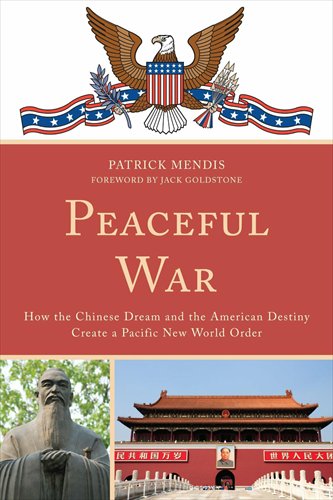HOME >> OP-ED
Chinese dream harks back to golden era while reinventing hopeful future
Source:Global Times Published: 2013-10-24 19:03:01

Patrick Mendis, Peaceful War: How the Chinese Dream and the American Destiny Create a Pacific New World Order, Rowman & Littlefield, October 2013
When Chinese President Xi Jinping delivered his speech on the "Chinese dream" and national revival, many Americans made an instant connection with their own ideal of the "American dream." But what they did not realize is that the Chinese dream is actually much older than that of their own.China is an amalgamation of world cultures. Since the times of the Silk Road, China engaged in not only material trade, but also trade in ideas. It was through this cultural exchange that China strengthened itself and became the dominant power of the Asia Pacific region. Likewise in present times, China has borrowed ideas from the West and made them Chinese.
In pre-modern China, when appealing to the emperor, one did not say that he had a "great new idea," but rather he would say that he had a "great old idea," an ancient one. The notion of the Chinese dream is nothing new; it is an idea of bringing prosperity to the Chinese people and others while rising again as a world power.
In his newest book, Peaceful War, UNESCO Commissioner Patrick Mendis, also a professor at George Mason University, crafts the novel idea of a Chinese re-writing of the American dream, in which China will quietly rise in creating a new Pacific world order.
With Beijing's ascending role in global affairs, Mendis believes both the US and China will cooperate for the sake of developing trade, economic growth, and international stability.
Just as the American experiment evolved, Mendis argues that Deng Xiaoping's China used "Hamiltonian means to Jeffersonian ends" and borrowed the idea of the American dream as a model for China's peaceful rise.
More interesting is his historical accounts of ancient Buddhist diplomacy between China and his native country of Sri Lanka, which the author traces back to the glorious era of Chinese admiral Zheng He who traveled several times through the Indian Ocean to Africa and the Middle East, long before the discovery of America.
The Chinese dream, as reinvented by Chinese President Xi Jinping, continues Deng's experiment into the 21st century by reviving China's illustrious history and economic diplomacy.
Mendis focuses on Sino-US relations in the Pacific and Indian oceans. While talking about the Chinese dream, he emphasizes that the Chinese also have a vision, which is based on a fusion of Confucian ideology and communist doctrine.
Through the ethos of Confucianism, China has attempted to sow the seeds of harmony and virtue throughout society and with the centralized and supreme power of the CPC, China is being led into the modern world as a worthy philosophical rival to the US.
In his Peaceful War, Mendis portrays the Chinese and US visions as being forces which powerfully shape not only each country's national identity, but also as the basis for their domestic and international relations.
As China has emerged onto the world stage once again, a question has arisen as to how the two powers' visions will interact, and whether or not they will clash in civilization in an all-out brawl of East meets West.
In this scholarly work, the author offers a much needed and timely antidote to prevailing pessimism over the future of Sino-US relations.
This book review was written by Jacob Bressman, a resident of Beijing and employed as a government relations consultant at a top worldwide firm. He is a graduate of the George Washington University where he majored in Asian Studies and Chinese Language & Literature.
Posted in: Fresh off the Shelf, Viewpoint